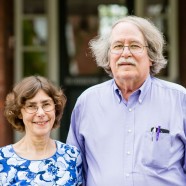
After 42 years at Milton—24 of those years living in Robbins House—lots of adjustments loom ahead. One of these adjustments may not occur to most people as they think about retiring: Erica and I are going from living our everyday lives with at least fifty people to living with just one person: to living with each other. Fifty personal styles and fifty voices; fifty sets of needs and fifty senses of humor, or lack thereof; fifty cases of fatigue and fifty levels of energy; fifty fans of brownies and fifty pairs of willing ears.
We’ve never had trouble coming up with things to talk about, but how will we do when we can actually finish our sentences—or when we can follow one thought with another that may actually be connected? How will we do when the only schedules we need to organize and synchronize and oversee are our own?
Certainly, some practical advantages will occur to you: Less noise: no more 6 a.m. fire drills; no 10:55 p.m. shouting on the quad; speech team people won’t be leaving at 6 a.m. on a Saturday morning when we’ve been on duty ’til 1 a.m.—and the list goes on.
Getting up and going to bed when we choose!
Locally sourced food: ours!
Fewer late-night and middle-of-the-night intrusions: when the girl DOES get invited to the prom by the “right” person just before check-in; when a dorm staff person announces her pregnancy to the girls and it elicits a screaming and jumping-up-and-down fest that I am SURE registered on the Richter scale; when some girls come to tell us of a lapse of judgment; or when girls come to talk with us about changes in their relationships with their parents and of realizations about themselves. So many have been happy moments, but the poignant and sad ones have been, in the long run, rewarding as well.
Clearly, we will miss the close connections with students and their parents and the impromptu visits from alumnae, because sharing our home and our lives with so many people has meant that we and our daughters have known people from all over the world and from every imaginable background. We’ve come to a deep awareness of the vastness and diversity of the peoples of the world, in the most organic way: by actually knowing people. Counterintuitively, that very vastness has made the world feel smaller and more connected, as the natural or human-made disasters in other parts of the world become a lot more personal, because we know someone from there.
Among the things we will miss most are the relationships we have with other members of the Milton community, and especially those who have lived or DO live in dorms, and most especially those with whom we have lived in Robbins. They are the people who understand in their bones the wonderful but crazy lifestyle inherent in dormitory living. The shared values, shared trust and frequent substantive conversations with these people are an integral part of our lives, and we will sorely miss them.
Being an important part, over the course of two, three or four years, of transitions in the lives of exceptional young women has been an extraordinary experience, formative and unparalleled for Erica and for me. If you ask our friends, they’ll tell you that they’re not worried about what we’ll do when we have only one another rather than a host of fifty. I’m sure they’re right, but just like the girls who arrive at Robbins House for their first year at Milton, we’ll need to learn some things as we go along.
John Banderob
Mathematics Department, 1974–2016
Robbins House, 1992–2016



